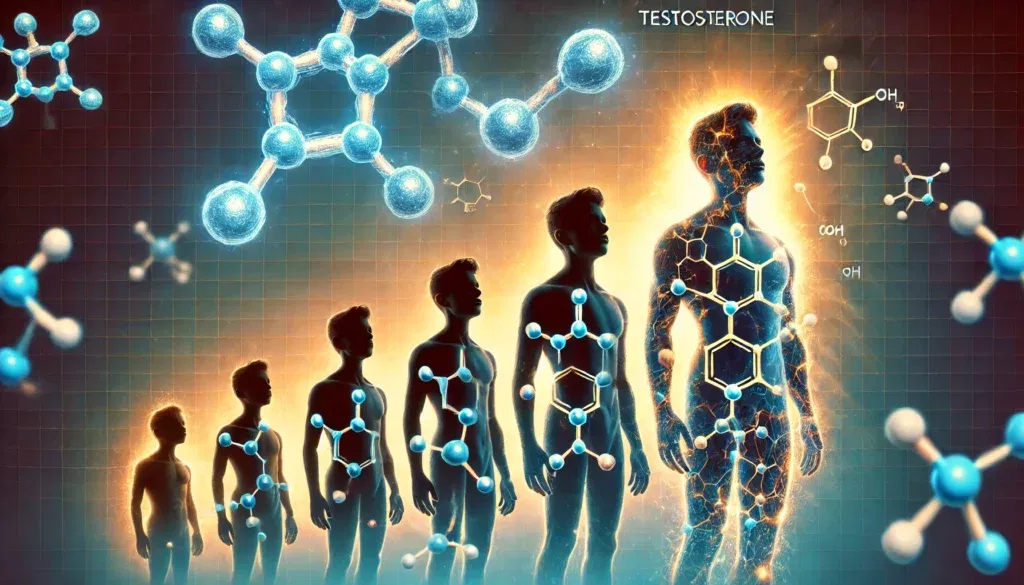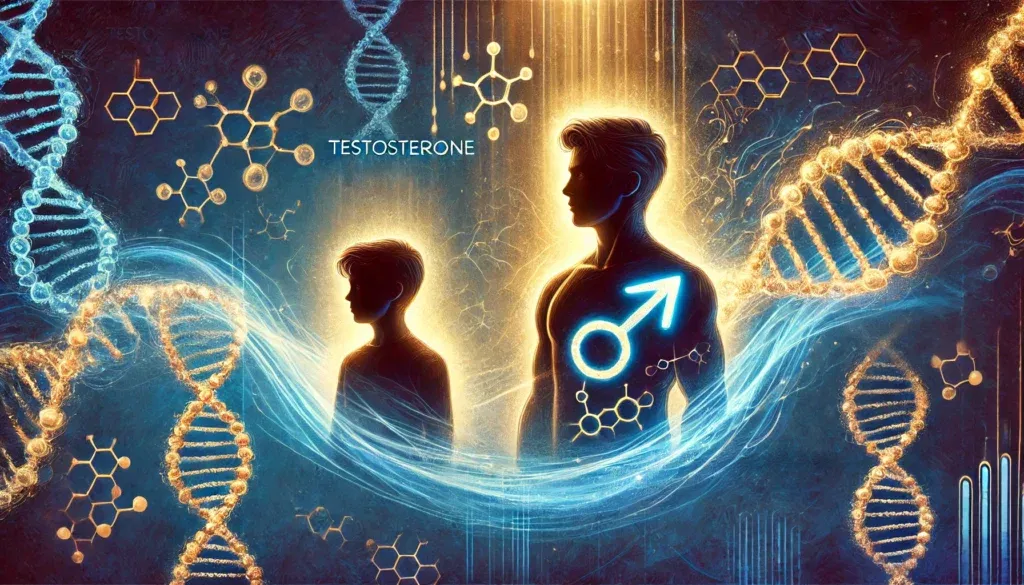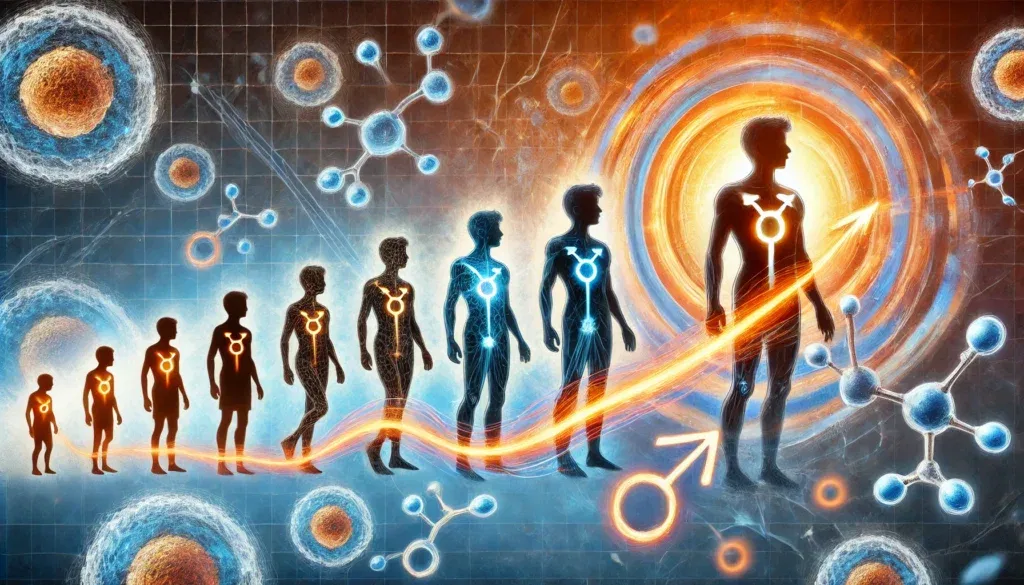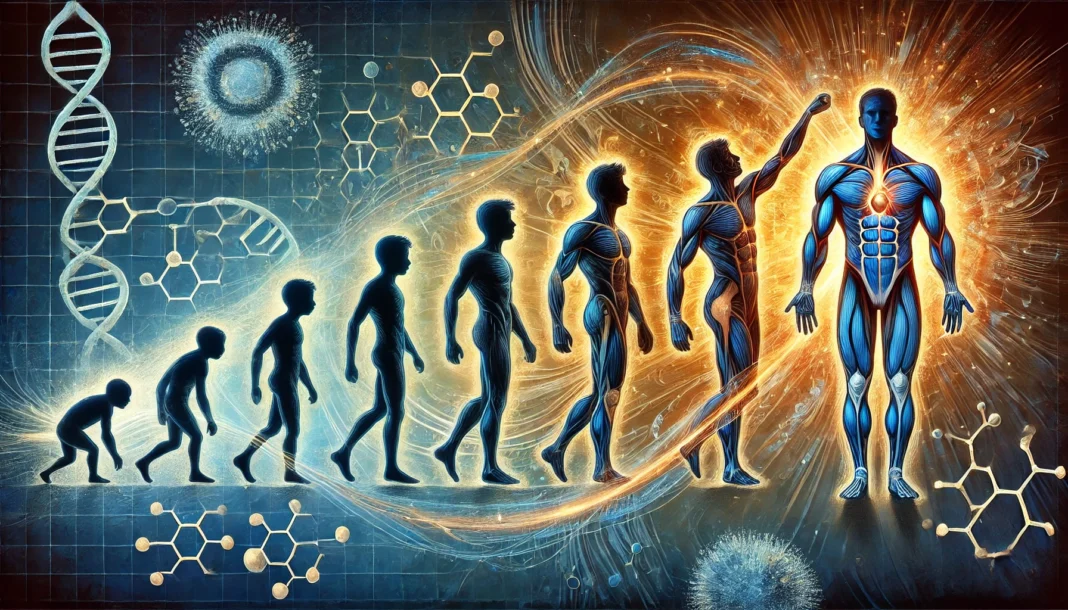Puberty is a critical phase of human development, marking the transition from childhood to adulthood. This period is characterized by rapid physical growth, emotional changes, and significant hormonal fluctuations. Among the many hormones involved in puberty, testosterone plays a particularly vital role in shaping the physical and physiological aspects of male development. As a primary androgen, testosterone influences various processes, including muscle growth, voice deepening, bone density, and reproductive function. Understanding how testosterone impacts puberty provides essential insights into teenage growth and development, shedding light on how hormonal balance affects overall health. This article explores the role of testosterone in puberty, the factors influencing its production, and the implications of imbalances during adolescence.
You may also like: How to Increase Testosterone Levels Naturally: Science-Backed Strategies for Men’s Health & Longevity
The Role of Testosterone in Male Puberty
Testosterone is the primary sex hormone in males, produced primarily in the testes and, to a lesser extent, in the adrenal glands. Its production significantly increases during puberty, leading to a cascade of developmental changes. One of the earliest effects of testosterone in puberty is the growth of the testes and penis, which signals the beginning of reproductive maturation. This growth is accompanied by the activation of sperm production, marking a crucial step toward fertility.
Another major effect of testosterone during puberty is the development of secondary sexual characteristics. These include the deepening of the voice due to the enlargement of the larynx and the thickening of vocal cords. The growth of facial, pubic, and body hair is also driven by rising testosterone levels, distinguishing male physical traits. Additionally, testosterone contributes to increased muscle mass and bone density, resulting in a more defined and robust physique.
The influence of testosterone extends beyond physical changes; it also affects mood and behavior. Many teenagers experience mood swings, aggression, and increased competitiveness, partly due to hormonal shifts. These behavioral changes are linked to the effects of testosterone on the brain, influencing areas related to emotional regulation and risk-taking behaviors. Understanding these effects helps parents, educators, and healthcare providers support adolescents through the challenges of puberty.

Testosterone and Growth Spurts in Teenagers
One of the most noticeable changes during puberty is the rapid increase in height, commonly referred to as a growth spurt. Testosterone plays a significant role in this process by stimulating the elongation of bones through the activation of growth plates, also known as epiphyseal plates. This hormone works in conjunction with growth hormone (GH) and insulin-like growth factor 1 (IGF-1) to ensure optimal skeletal development.
During early puberty, testosterone primarily promotes linear bone growth, allowing teenagers to gain several inches in height within a few years. However, as puberty progresses, testosterone also contributes to the eventual closure of growth plates, signaling the end of height increase. The timing and extent of growth spurts vary among individuals, influenced by genetic, nutritional, and environmental factors.
Apart from height, testosterone affects overall body proportions. Males typically experience a broadening of the shoulders, a narrowing of the waist, and an increase in muscle mass. These changes contribute to the classic masculine physique, distinguishing male adolescents from their female counterparts. The anabolic effects of testosterone on muscle tissue make it a key factor in athletic performance and physical strength during teenage years.
Factors Affecting Testosterone Levels During Puberty
While testosterone production is primarily regulated by the hypothalamic-pituitary-gonadal (HPG) axis, several factors can influence its levels during puberty. Genetic predisposition plays a fundamental role in determining the timing and extent of hormonal changes. Some teenagers experience early or delayed puberty due to inherited traits related to hormone production and receptor sensitivity.
Nutrition and lifestyle choices also impact testosterone levels. A well-balanced diet rich in essential nutrients such as zinc, vitamin D, and healthy fats supports optimal hormone synthesis. Conversely, a diet high in processed foods, excessive sugar, and unhealthy fats may negatively affect testosterone production. Additionally, regular physical activity, especially resistance training, can enhance testosterone levels, while chronic stress and inadequate sleep may suppress its production.
Environmental factors, including exposure to endocrine-disrupting chemicals (EDCs), can also interfere with testosterone regulation. Certain chemicals found in plastics, pesticides, and personal care products may mimic or block hormone activity, leading to imbalances. Adolescents should be mindful of their environment and adopt healthy habits to support hormonal health during this crucial developmental stage.
Consequences of Low Testosterone in Adolescence
Low testosterone levels during puberty can lead to delayed or incomplete development. One of the most apparent signs of low testosterone is delayed growth and a lack of secondary sexual characteristics. Teenagers with insufficient testosterone may experience slower muscle development, reduced bone density, and minimal facial or body hair growth.
In addition to physical effects, low testosterone can impact mental and emotional well-being. Adolescents with hormonal deficiencies may struggle with low energy levels, depression, and difficulty concentrating. These symptoms can affect academic performance, social interactions, and overall quality of life.
In some cases, medical conditions such as hypogonadism can cause low testosterone levels. This condition occurs when the testes fail to produce adequate amounts of testosterone due to genetic, autoimmune, or developmental disorders. Early diagnosis and appropriate medical intervention, such as hormone replacement therapy, can help affected individuals achieve normal puberty progression.
The Potential Risks of Excessive Testosterone
While adequate testosterone levels are essential for puberty, excessive amounts can lead to adverse effects. High testosterone levels may result from genetic factors, steroid abuse, or endocrine disorders. One of the primary concerns associated with excess testosterone is premature closure of growth plates, which can stunt height potential.
Elevated testosterone levels may also contribute to aggressive behavior, mood swings, and impulsive decision-making. Some teenagers may exhibit heightened irritability, risk-taking behaviors, or difficulty managing emotions. Additionally, excessive androgen activity can lead to acne outbreaks due to increased sebum production, a common concern among adolescents.
In some cases, external factors such as anabolic steroid use can artificially elevate testosterone levels. Some teenagers seeking enhanced athletic performance or muscular development may resort to steroids, unaware of the potential health risks. Long-term steroid use can disrupt natural hormone production, leading to testicular shrinkage, infertility, and cardiovascular complications. Education on the dangers of steroid abuse is crucial for promoting responsible health choices.

Frequently Asked Questions (FAQ) About Testosterone and Puberty
1. How does testosterone help with puberty in males?
Testosterone plays a crucial role in puberty by driving the development of primary and secondary sexual characteristics. It triggers the growth of facial and body hair, deepens the voice, and increases muscle mass. Additionally, testosterone in puberty contributes to bone density and the maturation of reproductive organs. Beyond physical changes, it also affects mood, energy levels, and cognitive function. Proper testosterone levels ensure a smooth transition into adulthood, while deficiencies can lead to developmental delays.
2. Can testosterone for teenagers be prescribed to boost puberty?
In cases where puberty is delayed due to low testosterone levels, doctors may prescribe testosterone for teenagers under medical supervision. This treatment is typically reserved for those with conditions like hypogonadism, where the body produces insufficient testosterone. However, medical professionals carefully evaluate hormonal balance before prescribing therapy. Excessive or unnecessary testosterone supplementation can lead to side effects such as acne, aggression, or abnormal growth patterns. Parents concerned about delayed puberty should consult an endocrinologist for a comprehensive evaluation.
3. What are the natural ways to support testosterone in puberty?
Maintaining a balanced diet rich in healthy fats, proteins, and essential vitamins supports testosterone production. Foods like eggs, lean meats, nuts, and leafy greens contribute to optimal hormone levels. Regular exercise, especially resistance training, has been shown to enhance testosterone for teenagers. Additionally, getting enough sleep and managing stress are crucial, as both sleep deprivation and chronic stress can suppress testosterone levels. Avoiding processed foods and excessive sugar intake can further support a healthy hormonal balance.
4. Can low testosterone in puberty affect mental health?
Yes, low testosterone levels during puberty can impact mental well-being, leading to mood swings, anxiety, and even depression. Since testosterone influences brain function, deficiencies may cause issues with focus, motivation, and confidence. Adolescents experiencing symptoms such as persistent fatigue, irritability, or lack of interest in activities should seek medical advice. Early intervention can help manage hormonal imbalances and prevent long-term psychological effects. A combination of lifestyle adjustments and medical guidance can help restore balance.
5. What are the risks of using synthetic testosterone for teenagers without medical supervision?
Self-administering synthetic testosterone without a doctor’s approval can lead to serious health complications. Potential risks include liver damage, high blood pressure, and reduced sperm production. In some cases, excessive testosterone use can stunt growth by causing premature closure of growth plates. Psychological effects, such as increased aggression and mood instability, have also been observed. It is essential for teenagers to seek professional medical advice before considering any form of testosterone supplementation.
6. How does testosterone influence muscle growth during puberty?
Testosterone is a key driver of muscle growth, as it promotes protein synthesis and increases muscle fiber size. This is why teenage boys often experience rapid gains in strength and muscle mass during puberty. Engaging in physical activities like weight training and sports can further enhance muscle development. However, it is important to follow age-appropriate workout routines to avoid injuries. Proper nutrition, including sufficient protein intake, complements the muscle-building effects of testosterone in puberty.
7. Can too much testosterone in puberty cause negative effects?
While testosterone is essential for normal development, excessive levels can lead to unwanted side effects. High testosterone in puberty may contribute to severe acne, aggressive behavior, and increased risk-taking tendencies. In some cases, it can also result in gynecomastia (enlarged breast tissue in males) due to hormonal imbalances. Maintaining a healthy lifestyle helps regulate testosterone levels naturally. If concerns arise regarding hormonal imbalances, consulting a healthcare provider is the best course of action.
8. How does testosterone impact height growth during puberty?
Testosterone plays a role in bone development and influences height growth during puberty. It stimulates growth spurts by promoting bone lengthening, but it also leads to the eventual closure of growth plates. If testosterone levels rise too quickly, growth plates may close prematurely, limiting final height potential. This is why doctors monitor hormone levels in teenagers with growth concerns. Adequate sleep, nutrition, and exercise support natural growth and ensure proper testosterone function.
9. Do lifestyle choices affect testosterone for teenagers?
Yes, lifestyle factors significantly impact testosterone levels during puberty. A sedentary lifestyle, poor diet, and high stress can lower testosterone production. On the other hand, regular physical activity, balanced nutrition, and stress management promote healthy hormone levels. Avoiding excessive screen time and prioritizing outdoor activities can also be beneficial. Parents and teens should be aware of how daily habits influence hormonal health and overall well-being.
10. How does testosterone in puberty differ between males and females?
While both males and females produce testosterone, its effects differ significantly between the sexes. In males, testosterone drives puberty by developing reproductive organs, increasing muscle mass, and deepening the voice. In females, testosterone is produced in smaller amounts and contributes to muscle tone, mood regulation, and bone strength. Imbalances in testosterone levels can lead to health issues in both genders. Understanding these differences helps in recognizing and managing hormonal health effectively.

Conclusion: Understanding Testosterone’s Impact on Teenage Growth and Development
Testosterone is a fundamental hormone that drives the physical and physiological changes associated with male puberty. Its role in growth, muscle development, voice deepening, and reproductive function underscores its significance in adolescent development. While natural variations in testosterone levels exist, maintaining hormonal balance is essential for overall health and well-being during puberty.
Ensuring optimal testosterone levels requires a combination of genetic predisposition, proper nutrition, regular physical activity, and a healthy lifestyle. Recognizing the signs of hormonal imbalances, whether due to deficiency or excess, allows for early intervention and appropriate medical support. By fostering a deeper understanding of testosterone’s impact on puberty, parents, educators, and healthcare professionals can provide valuable guidance to adolescents navigating this transformative phase of life.
teenage growth hormones, hormonal changes in puberty, testosterone and puberty development, male adolescence and hormones, impact of testosterone on teenage body, puberty and hormone regulation, testosterone deficiency in teenagers, hormonal imbalance in teenage boys, testosterone levels during puberty, puberty growth spurts in males, teenage muscle development, testosterone and bone growth, reproductive health in adolescence, teenage hormonal fluctuations, puberty milestones in boys, testosterone effects on behavior, endocrine health in teenagers, natural testosterone boosters for teens, puberty health education, male puberty stages
Further Reading:
Testosterone Use in Adolescent Males: Current Practice and Unmet Needs
Testosterone Therapy in Adolescent Boys: The Need for a Structured Approach
Disclaimer: The information provided in this article is for general informational purposes only. The content does not constitute professional advice of any kind, including but not limited to medical, legal, or financial advice. HisHealthMag and its contributors make no representations or warranties regarding the accuracy, completeness, or reliability of the information presented. Always seek the advice of a qualified professional for any specific concerns or questions you may have. Neither HisHealthMag nor its authors assume any responsibility or liability for any actions taken based on the information provided in this article. The views and opinions expressed are those of the author(s) and do not necessarily reflect the official policy or position of HisHealthMag.





